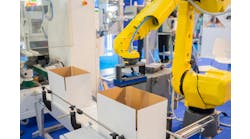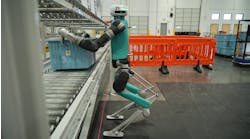Grandkids are so much fun, and you can give them back. We just had our fourth grandchild on Nov. 19, so everything is fresh.
The oldest is 3 years old and loves the dirt. His brother may turn out to be a very shy Broadway actor. Freddie, our granddaughter, might just be the cutest “whatever she wants to be” person, but, at just 1, she has much time to decide.
And now we have another precious grandchild, and of course I wondered what she will experience in her life, as with the other three, as well.
Screen flipping, buttons and rebooting are already known actions. The TV remote is easily mastered. Books are read on a screen, as well as hard copy. Hard copy almost sounds funny.
So what will these kids grow up with? What we thought would be true could in fact get torpedoed by a new president, but that’s another story.
ALSO READ: Who will hire these robots?
Global trade is a big part of our past and needs to be in our future. Without it, we may not have enjoyed such things as robotics (Fanuc), beer (Stella Artois) and other life-changing items, technology and lifestyle benefits.
However we are in changing times. John Kaiser, a small-cap mining analyst, delivered a presentation at Metals Investor Forum 2016 in Vancouver, Canada. One slide stopped me in my tracks.
He discussed two important questions “that are troubling Americans.”
What will the worker of the future do, in reference to automation, to consume the goods produced by those automated systems? That was the first question.
The second question related to the retirement issues faced by an ever-increasing generation of individuals with ever-increasing longevity expectations.
Regarding the first question, this has been discussed ever since automation came to bear. We talk about creating other jobs, but the lost jobs will never be replaced. As the new U.S. president-elect talks coal, most other governments talk green.
The coal jobs will be replaced by green jobs. Sorry, kids. That can’t happen, and it won’t happen. You have to be groomed for that industry from the ground up. Aerodynamics, chemistry, technology and many other disciplines will be needed to be able to function in green projects.
Question 2 is very disturbing, since, if the people in Question 1 don’t get the work they need to pay into programs that help support the peeps in Question 2, then not only are the Q2 peeps screwed, but so are the ones in Q1.
And that is happening right now. Pension liabilities are crippling businesses and industries because they expected nothing could go wrong.
Getting jobs back to North America from China and even Mexico won’t necessarily create employment, but it will create commerce. Unions will have to have much more tolerance for contracts if they don’t want to be replaced when and if these businesses come back to the mother ship.
Nothing in the president-elect’s rhetoric has laid out any platform regarding companies not being able to use technology.
So my 3-year-old grandson wants to play in the dirt, like his dad. So, check out Fastbrick Robotics from down under.
They have developed a massive Hadrian X robot which—wait for it—lays bricks. The company states that it can build a shell in two days, which “replaces weeks of work by masons.” It can lay 1,000 bricks per hour. The use of this brand of technology will need to be outlawed in order to create the jobs, but this will destroy the perception of being more competitive.
Catch 22?
I can already foresee a robotic backhoe, grader, bulldozer and the like being used in mining installations. While presently semi-autonomous machines are the norm, fully autonomous machines will not be long in coming.
Did I mention Uber as a software service? It seems unmanned cars will be the norm here, and mostly electric, which will make a mechanic obsolete.
And don’t ask anyone who was with Kodak as to whether any of our Fortune 500 companies can disappear due to technology. Production may come home, but I fear not the jobs.
So what jobs is the president-elect talking about? I am certainly not the one to ask. I am more concerned for these four little minds and faces that I have been blessed with. I wonder what I can do as an old gray hair to form some things into their minds about learning, and learning the right stuff for their future.
I am very unclear as to what that might be. Imagine that car accidents are a thing of the past. What industries get affected other than the obvious?
Unintended consequences would be the insurance industry. Would we even need it?
If we have a world of convenience without working for it, how can we afford it when we are not participating? I sincerely hope I can guide my grandkids away from that brick wall. I can’t let them down.
Main navigation image courtesy of Fastbrick Robotics






